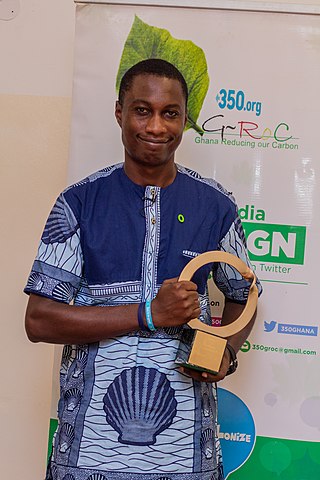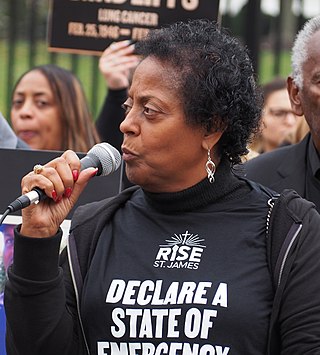
The Goldman Environmental Prize is a prize awarded annually to grassroots environmental activists.

The Kintigh Generating Station, also known as Somerset Operating Co. LLC of the Upstate New York Power Producers was a 675-megawatt coal-fired power plant located in Somerset, New York, United States. The plant was owned by AES Corporation until bankruptcy. Its unit was launched into service in 1984. Coal is provided to the plant via the Somerset Railroad. The waste heat is dumped into Lake Ontario, resulting in a warm-water plume visible on satellite images. The plant's 625-foot smoke stack can be seen across Lake Ontario from the shores of Toronto, Pickering, Oshawa, and Ajax, Ontario. It can also be seen from points along the Niagara Escarpment, including Lockport, NY, approximately 20 miles south. Power from the plant is transferred by dual 345kV power lines on wood pylons, which run south from the plant through rural agricultural land. In Royalton, NY they split at their physical junction with the dual circuit 345-kV Niagara-to-Edic transmission line, owned by the New York Power Authority, one circuit heads west to a substation at Niagara Falls, the other heads east to Station 80 south of Rochester. This bulk electric transmission constraint, created by the Somerset plant tie-in and forcing wheeling through 230kV and 345kV transmission lines to the Homer City Coal Plant east of Pittsburgh, PA, and returning to NY at the Watercurry substation outside Elmira, will be resolved through the Empire State Line proposal approved by NY Independent System Operator (NYISO).

The Fisk Generating Station, also known as Fisk Street Generating Station or Fisk Station is an inactive medium-size, coal-fired electric generating station located at 1111 West Cermak Road in the Pilsen neighborhood of Chicago, Illinois. It was sited near the south branch of the Chicago River to provide access to water for steam and barge traffic for coal, and closed down in 2012.

The Capitol Power Plant is a fossil-fuel burning power plant which provides steam and chilled water for the United States Capitol, the Supreme Court, the Library of Congress and 19 other buildings in the Capitol Complex. Located at 25 E St SE in southeast Washington, D.C., the CPP was the only coal-burning power plant in the District of Columbia, and it now mostly uses natural gas. The plant has been serving the Capitol since 1910, and is under the administration of the Architect of the Capitol.
The Environmental Law and Policy Center (ELPC) is a Midwest-based non-profit environmental advocacy group, with offices in Chicago, Columbus (Ohio), Des Moines (Iowa), Duluth (Minnesota), Jamestown (North Dakota), Madison (Wisconsin), Sioux Falls (South Dakota), and Washington, D.C. ELPC's mission is to advance environmental progress and economic development together throughout the Midwest through projects that advance clean energy, clean air, clean water and clean transportation.

WE ACT for Environmental Justice is a nonprofit environmental justice organization based in Harlem, Manhattan, New York City. The organization was founded in March 1988 to mobilize community opposition to the city's operation of the North River Sewage Treatment Plant, and the siting of the sixth bus depot in Northern Manhattan.
Air pollution is the introduction of chemicals, particulate matter, or biological materials into the atmosphere that cause harm or discomfort to humans or other living organisms, or damage ecosystems. Health problems attributed to air pollution include premature death, cancer, organ failure, infections, behavioral changes, and other diseases. These health effects are not equally distributed across the U.S. population; there are demographic disparities by race, ethnicity, socioeconomic status, and education. Air pollution can derive from natural sources, such as wildfires and volcanoes, or from anthropogenic sources. Anthropogenic air pollution has affected the United States since the beginning of the Industrial Revolution.
Respiratory Health Association is a nonprofit organization located on Chicago's Near West Side.
Maria Gunnoe is a native West Virginian who opposes mountaintop removal mining, and is a winner of the Goldman Prize and Wallenberg Medal.

Crawford Generating Station was a coal−fired power plant built in 1924. It was located in the South Lawndale community of Chicago, Illinois.

Phyllis Omido, dubbed the "East African Erin Brockovich", is a Kenyan environmental activist. She was one of 6 people to be awarded the Goldman Environmental Prize in 2015. She is known for organizing protests against a lead smelting plant located in the middle of Owino Uhuru, a slum near Mombasa. The plant was causing lead poisoning by raising the lead content in the environment, killing residents, in particular children, and harming others, including her own child. The plant was ultimately closed.

Uroš Macerl is an organic farmer and environmental activist from Slovenia. He won the Goldman Environmental Prize in 2017 after leading a successful legal challenge against the company operating a cement kiln that was incinerating hazardous waste near his farm.
The Little Village Environmental Justice Organization (LVEJO) is a non-profit organization based in Chicago, Illinois. Originally founded in 1994, LVEJO's mission is to achieve environmental justice in the Little Village area of Chicago. LVEJO's work is centered around working with the community and aims to address the root of environmental issues.

Ngụy Thị Khanh is a Vietnamese environmentalist who is the executive director, and founder, of the Green Innovation and Development Centre (GreenID) in Vietnam. Khanh is also the advocacy coordinator for the Vietnam Rivers Network (VRN).

Chibeze Ezekiel is a Ghanaian environmental activist and a 2020 Goldman Environmental Prize award recipient for Africa. He is known to have challenged the Ghanaian Ministry of Environment to cancel the construction of a coal plant through activism.

Sharon Lavigne is an American environmental justice activist in Louisiana focused on combating petrochemical complexes in Cancer Alley. She is the 2022 recipient of the Laetare Medal, the highest honor for American Catholics, and a 2021 recipient of the Goldman Environmental Prize.

Destiny Watford is an American environmental activist. She won a Goldman Environmental Prize in 2016.
Kimiko Hirata is a Japanese climate activist. As a founder of the Kiko Network, a non-governmental organization, she has campaigned for emissions reductions for more than 20 years. As of December 2022, her grassroots work has led to the cancellation of 17 planned coal-power plants. Hirata also led landmark coal divestment campaigns against Mizuho Financial Group and Mitsubishi UFJ. She currently serves as executive director for the Tokyo-based think tank, Climate Integrate, which focuses on accelerating decarbonization.

The Neighbors for Environmental Justice (N4EJ) is an environmental justice group located on Chicago's Southwest Side. N4EJ was founded in 2017, in response to happenings of a local asphalt plant, MAT Asphalt. As an environmental organization, N4EJ focuses its efforts on environmental justice, advocacy, public outreach, and education. Additionally, N4EJ collects environmental data and meets with local officials to discuss the prevention of future developments such as MAT Asphalt.
Jacqueline (Jacqui) Patterson is founder of The Shirley Chisholm Legacy Project and former director of the NAACP Environmental and Climate Justice Program, which are dedicated to addressing the intersecting issues of environmental and social justice. Her work focuses on empowering marginalized communities, particularly Black women, by providing resources and advocating for systemic change towards a sustainable and equitable future.













